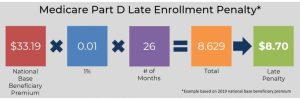Table of Contents
-
- Introduction
- Exploring the Benefits of Medicare Ophthalmology Coverage
- How to Maximize Your Medicare Ophthalmology Coverage
- Common Questions About Medicare Ophthalmology Coverage
- Understanding the Cost of Medicare Ophthalmology Coverage
- What to Look for When Choosing a Medicare Ophthalmology Provider
- Conclusion
“See Clearly with Medicare Ophthalmology Coverage!”
Introduction
Medicare ophthalmology coverage is an important part of the Medicare program. It provides coverage for eye exams, glasses, contact lenses, and other vision-related services. Medicare ophthalmology coverage is available to those who are 65 years of age or older, as well as those who are disabled and meet certain criteria. Medicare ophthalmology coverage can help seniors and disabled individuals maintain their vision health and prevent vision loss. This article will provide an overview of Medicare ophthalmology coverage, including what services are covered, how to apply for coverage, and what costs are associated with the coverage.
Find Medicare Plans in 3 Easy Steps
We can help get up to $0 monthly premium Medicare plans
Exploring the Benefits of Medicare Ophthalmology Coverage
Medicare coverage for ophthalmology services is an important benefit for many seniors. Ophthalmology services can help diagnose and treat a variety of eye conditions, including glaucoma, cataracts, and age-related macular degeneration. With the right coverage, seniors can access the care they need to maintain their vision and quality of life.
Medicare Part B covers a variety of ophthalmology services, including eye exams, glaucoma screenings, and cataract surgery. Medicare Part B also covers the cost of corrective lenses, such as eyeglasses and contact lenses. In addition, Medicare Part B covers the cost of certain medications used to treat eye conditions.
Medicare Part B also covers the cost of certain preventive services, such as glaucoma screenings and eye exams. These screenings can help detect eye conditions early, which can help prevent vision loss. Medicare Part B also covers the cost of certain treatments, such as cataract surgery and laser eye surgery.
Medicare Part B also covers the cost of certain vision rehabilitation services, such as low vision therapy and vision rehabilitation. These services can help seniors maintain their independence and quality of life.
In addition to the services covered by Medicare Part B, some Medicare Advantage plans offer additional coverage for ophthalmology services. These plans may cover the cost of additional eye exams, corrective lenses, and treatments.
The benefits of Medicare ophthalmology coverage are clear. With the right coverage, seniors can access the care they need to maintain their vision and quality of life. With the right coverage, seniors can access the care they need to maintain their independence and quality of life.
How to Maximize Your Medicare Ophthalmology Coverage
Medicare coverage for ophthalmology services can be a great way to save money on vision care. However, it is important to understand the coverage and how to maximize it in order to get the most out of your benefits. Here are some tips to help you maximize your Medicare ophthalmology coverage.
1. Know Your Coverage: Before you can maximize your coverage, you need to know what it is. Medicare Part B covers a variety of ophthalmology services, including eye exams, glaucoma tests, and cataract surgery. It also covers some corrective lenses and eyeglasses. Make sure you understand what is covered and what is not so you can plan accordingly.
2. Choose an In-Network Provider: Medicare has a network of providers that offer discounted services. Choosing an in-network provider can help you save money on your ophthalmology services. Make sure to check with your provider to see if they are in-network before scheduling an appointment.
3. Take Advantage of Preventive Care: Medicare Part B covers a variety of preventive care services, including eye exams and glaucoma tests. Taking advantage of these services can help you catch any potential vision problems early and save money in the long run.
4. Ask About Discounts: Many providers offer discounts for Medicare patients. Ask your provider if they offer any discounts or special rates for Medicare patients.
5. Consider Supplemental Coverage: Medicare Part B does not cover all ophthalmology services. If you need additional coverage, you may want to consider a Medicare Supplement plan. These plans can help cover the costs of services that are not covered by Medicare Part B.
By following these tips, you can maximize your Medicare ophthalmology coverage and get the most out of your benefits. Make sure to do your research and ask questions so you can get the best coverage for your needs.
Common Questions About Medicare Ophthalmology Coverage
1. What is Medicare Ophthalmology Coverage?
Medicare Ophthalmology Coverage is a type of coverage offered by Medicare, the federal health insurance program for people aged 65 and over, and certain younger people with disabilities. This coverage helps to pay for medically necessary eye care services, such as eye exams, eyeglasses, and contact lenses. It also covers certain treatments for eye diseases, such as glaucoma and cataracts.
2. Who is eligible for Medicare Ophthalmology Coverage?
Medicare Ophthalmology Coverage is available to people who are enrolled in Medicare Part B, which covers medical services and supplies. To be eligible, you must be 65 or older, or have a disability or end-stage renal disease.
3. What services are covered by Medicare Ophthalmology Coverage?
Medicare Ophthalmology Coverage covers medically necessary eye care services, such as eye exams, eyeglasses, and contact lenses. It also covers certain treatments for eye diseases, such as glaucoma and cataracts.
4. How much does Medicare Ophthalmology Coverage cost?
Medicare Ophthalmology Coverage is generally free for people who are enrolled in Medicare Part B. However, you may be responsible for certain out-of-pocket costs, such as copayments and coinsurance.
5. Where can I find more information about Medicare Ophthalmology Coverage?
You can find more information about Medicare Ophthalmology Coverage on the official Medicare website. You can also contact your local Social Security office or call 1-800-MEDICARE (1-800-633-4227) for more information.
Find Medicare Plans in 3 Easy Steps
We can help get up to $0 monthly premium Medicare plans
Understanding the Cost of Medicare Ophthalmology Coverage
Medicare coverage for ophthalmology services can be a confusing and costly endeavor for many individuals. Understanding the cost of Medicare coverage for ophthalmology services is essential for those who are considering utilizing these services.
Medicare Part B covers a variety of ophthalmology services, including routine eye exams, glaucoma screenings, and cataract surgery. However, there are certain services that are not covered by Medicare Part B, such as refractive surgery, laser vision correction, and contact lenses. Additionally, Medicare Part B does not cover routine eye care, such as eyeglasses or contact lenses.
The cost of Medicare coverage for ophthalmology services depends on the type of service being provided. For example, Medicare Part B covers 80% of the cost of routine eye exams, while Medicare Part B covers 100% of the cost of cataract surgery. Additionally, Medicare Part B covers 80% of the cost of glaucoma screenings.
In addition to the cost of the service itself, Medicare Part B also requires a deductible and coinsurance. The deductible is the amount that must be paid before Medicare Part B begins to cover the cost of the service. The coinsurance is the amount that must be paid after the deductible has been met. The amount of the deductible and coinsurance varies depending on the type of service being provided.
It is important to note that Medicare Part B does not cover the cost of any additional services or supplies that may be needed for the ophthalmology service. For example, if a patient needs a special lens or contact lens solution, they will need to pay for these items out of pocket.
Understanding the cost of Medicare coverage for ophthalmology services is essential for those who are considering utilizing these services. Knowing the cost of the service, the deductible, and the coinsurance can help individuals make informed decisions about their healthcare.
What to Look for When Choosing a Medicare Ophthalmology Provider
When choosing a Medicare ophthalmology provider, it is important to consider several factors. First, it is important to make sure that the provider is a Medicare-approved provider. This means that the provider is certified to provide services to Medicare beneficiaries. Additionally, it is important to make sure that the provider is experienced in treating ophthalmology-related conditions. It is also important to check the provider’s credentials, such as board certification and any additional certifications or specializations.
It is also important to consider the provider’s location. It is important to make sure that the provider is conveniently located and that the office is easily accessible. Additionally, it is important to make sure that the provider is accepting new patients and that the office is open during convenient hours.
It is also important to consider the provider’s reputation. It is important to read reviews and ask for referrals from friends and family. Additionally, it is important to make sure that the provider is up-to-date on the latest treatments and technologies.
Finally, it is important to consider the cost of services. It is important to make sure that the provider accepts Medicare and that the services are covered by Medicare. Additionally, it is important to make sure that the provider offers affordable payment plans and that the provider is willing to work with patients to find a payment plan that works for them.
By considering these factors, you can ensure that you are choosing a Medicare ophthalmology provider that is experienced, reputable, and affordable.
Find Medicare Plans in 3 Easy Steps
We can help get up to $0 monthly premium Medicare plans
Conclusion
In conclusion, Medicare Ophthalmology Coverage is an important benefit for seniors and those with disabilities. It helps to ensure that they have access to the eye care they need to maintain their vision and overall health. Medicare Ophthalmology Coverage is an important part of the overall Medicare program and should be taken advantage of by those who qualify.





